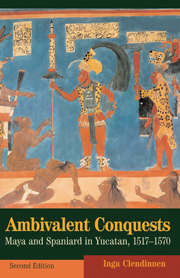Book contents
- Frontmatter
- Contents
- List of illustrations
- Preface to the second edition
- Preface to the first edition
- Acknowledgments
- Map I Yucatan in the conquest period
- Part I Spaniards
- 1 Explorers
- 2 Conquerors
- 3 Settlers
- 4 Missionaries
- 5 Conflict
- 6 Crisis
- 7 Attrition
- 8 Retrospections
- Epilogue: The hall of mirrors
- Part II Indians
- Epilogue: Confusion of tongues
- Appendix: A sampler of documents
- Glossary of Spanish and Maya terms
- Notes
- Select bibliography
- Index
Epilogue: The hall of mirrors
Published online by Cambridge University Press: 05 October 2013
- Frontmatter
- Contents
- List of illustrations
- Preface to the second edition
- Preface to the first edition
- Acknowledgments
- Map I Yucatan in the conquest period
- Part I Spaniards
- 1 Explorers
- 2 Conquerors
- 3 Settlers
- 4 Missionaries
- 5 Conflict
- 6 Crisis
- 7 Attrition
- 8 Retrospections
- Epilogue: The hall of mirrors
- Part II Indians
- Epilogue: Confusion of tongues
- Appendix: A sampler of documents
- Glossary of Spanish and Maya terms
- Notes
- Select bibliography
- Index
Summary
Colonial situations breed confusion. A favourite metaphor for the tangled miscommunications between native and outsider is a ‘confusion of tongues’, where the focus falls on the dangerous business of translation from one meaning system to another. There was certainly enough of that in the Yucatan situation, and the exploration of that dimension will be the concern of the next chapters. But colonial situations also spawn multiple realities, and that painful Assuring within the Spanish world is perhaps better caught by a different image: a hall of distorting mirrors in which each individual sees himself, as he thinks, truly reflected, while those about him are disquietingly altered into grotesques, as familiar gestures and expressions are exaggerated, parodied, even inverted. The settler-Franciscan division had always been deep; that it became deeper did not seriously threaten the sense of self of either. The case of Quijada was crueller: he found himself abandoned and left defenceless by that ‘law’ which had been his guide and shield. But it was the Franciscans themselves, causing suffering, who among the Spaniards suffered most, with the fracturing of that small intensely shared world of meanings painfully constructed through the perfected special tongue which was then used to destroy it. They had easily identified with Villalpando's unforgettable image of the Franciscan clasping the bleeding, befouled Indian in face of the homicidal rage of the Spanish settler. Then Toral had to watch settlers doing their poor best to protect wounded, weeping Indians from his Franciscan brothers' murderous anger.
- Type
- Chapter
- Information
- Ambivalent ConquestsMaya and Spaniard in Yucatan, 1517–1570, pp. 127 - 128Publisher: Cambridge University PressPrint publication year: 2003



